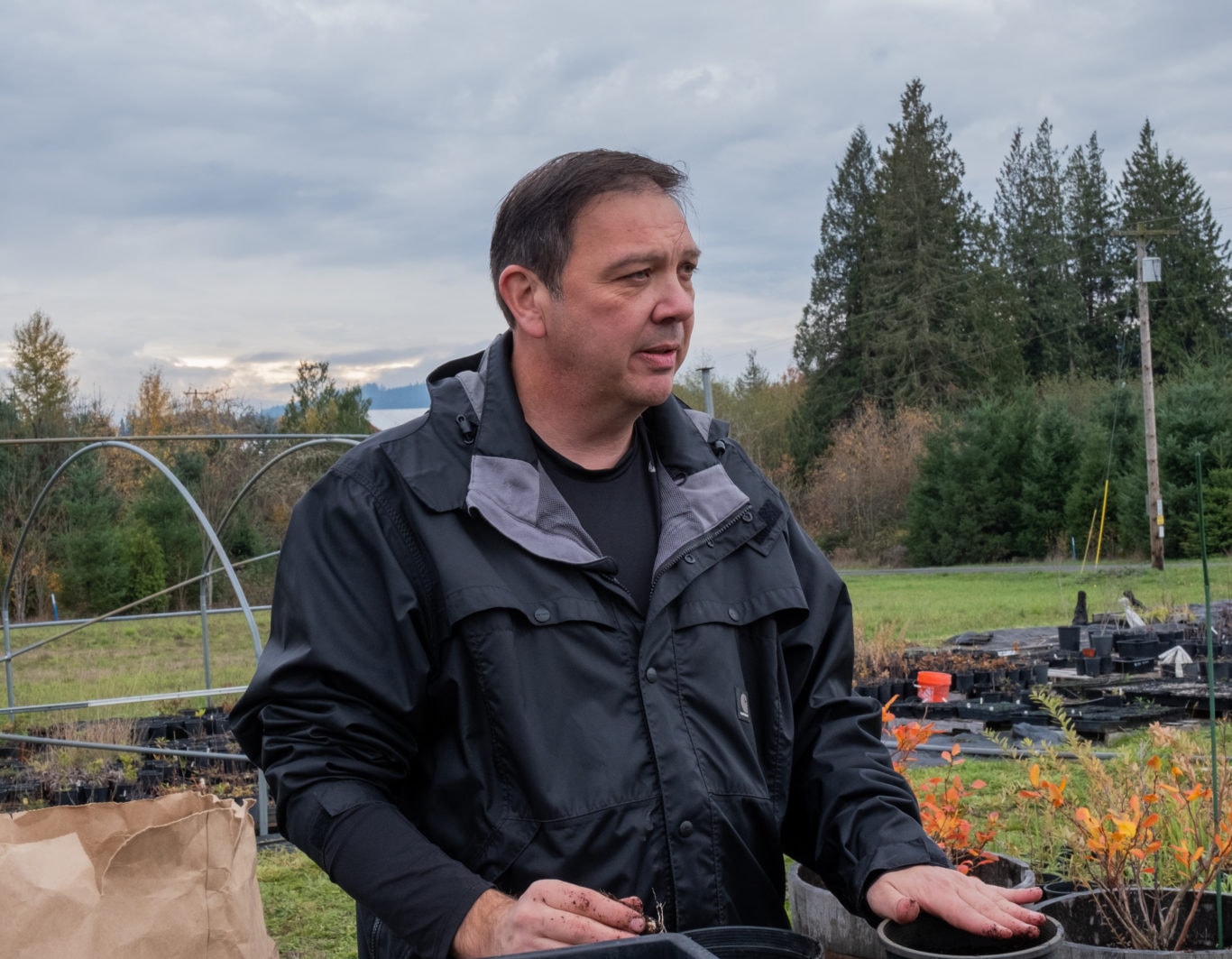— Duane Lane, Oregon Food Bank Food Systems Ambassador“As a child who relied on food boxes so heavily, I remember the commodities and the food that were distributed to us as a family. They were not the most nutritious or beneficial foods for my family. And they stuck with me throughout my life.”
Duane Lane is bringing First Foods back to his community
Duane Lane is bringing First Foods back to his community
As a descendent of the Yakama Nation and the fifth great-grandson of Chief Owhi — one of the signers of the Treaty of 1855 — Duane Lane understands the connection between colonization and hunger in Indigenous communities. Duane named his native plant business 1855 Plants to honor his family and to recognize 1855 as the year when settlers took away land that had been occupied for thousands of years by the 14 tribes that now make up the Yakama Nation. The treaty not only disrupted countless Native communities but also their sources of food. Logging and farming quickly destroyed many native plants and traditional hunting grounds.
Based in East Multnomah County, 1855 Plants is dedicated to raising plants using traditional, sustainable methods and helping homeowners, local government agencies and nonprofits integrate native plants into their landscaping and planning.
Duane is also one of the newest members of Oregon Food Bank’s Food Systems Ambassador program, which supports local leaders as they improve food security in their communities, address root causes of hunger and deliver culturally relevant foods to Native communities.
Duane is part of a growing movement to bring back First Foods and the culture they represent. “First Foods” refers to the more than 300 foods, from Chinook salmon to camas bulbs, that were staples of Indigenous diets and medicine in the Pacific Northwest for thousands of years before colonization.
“Indigenous communities are original caretakers of the area,” Duane explained, “but with constant expansion of our urban environments, it’s becoming harder and harder for the Native community to access native plants and First Foods, especially in an urban environment.
1855 Plants concentrates on growing and saving native plants from Lane County to Willamette Valley to Central Washington. They currently work with 50 to 75 different species.
Duane pointed out how traditional growing practices are essential to counteract the damage caused by corporate farming techniques and climate change.
“It's very important that community members, myself included, utilize low water consumption and non-petroleum products,” said Duane. “I don't use herbicides or pesticides and I use biochar to assist the plants and capture more of the nitrogen and nutrients. And I have beneficial microbes in my container soil that hopefully the homeowner takes and utilizes on their property. Utilizing traditional growing practices and using native plants is very important as the climate adjusts here in the Northwest.”
Before he started 1855 Plants in 2019, Duane worked for a local governmental agency in charge of urban restoration and wetland preservation. But after years of working with chemicals, herbicides and pesticides, he decided that approach to restoration was out of sync with his values.
When he began volunteering with local watershed organizations, Duane realized he wanted to work with native plants in these environments. He took an entrepreneur course at NAYA (Native American Youth and Family Center) and opened his business for the first year. But he needed space to farm. He turned to the incubator program at Headwaters Farm in Gresham, where he could lease land for up to five years.
Duane appreciates the importance of building community with other Indigenous farmers and growers. “The Native community is very willing to share their knowledge. We share information, we share resources, and we share traditional knowledge as well. Other farmers or growers teach me new techniques and share their knowledge and expertise, whether that's formal education or traditional education. I learned about biochar from other local Indigenous community members. We also often share financial resources as well. If there's an available grant or training sessions, we try to make others aware of what's going on in the community.”
In just a few years, Duane’s work has made tremendous progress toward increasing food security across Oregon. What’s next? His future ambitions include expanding to farmers markets, opening his space for the general public, helping to improve urban home environments, securing farmland and opening up a storefront nursery.
“It’s been very rewarding to me to start my journey, open my own business, and expand community outreach.”
You can support Oregon Food Bank programs like the Community Grower Fund and the Food Systems Ambassador program at OregonFoodBank.org/donate.
To learn more about 1855 Plants and shop their nursery, visit 1855plants.com.
